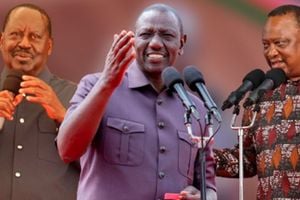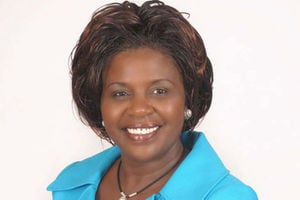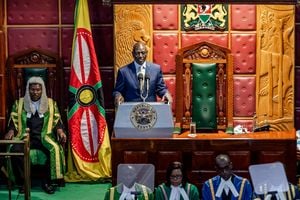What is your take on BBI’s plans on roles of independent bodies?

Kisumu Governor Anyang’ Nyong’o.
Kisumu has been earmarked as being key to promoting the blue economy due to its nearness to Lake Victoria. What is your administration doing to tap into the blue economy potential? Francis Njuguna, Kibichoi
The blue economy, simply put, refers to the use of all our water resources to support the livelihood of our people. It so happens that Kisumu was deliberately founded during colonial times as a key entry port into Lake Victoria, which is the largest fresh water lake in Africa, and the second largest in the world. The colonialists knew the economic value of the lake. We in Kisumu and in East Africa as a whole also know the economic value of the lake in terms of fishing, maritime transport connecting all the ports and harbours and its use for leisure and tourism. Although the port has been dominant since the collapse of the East African Community in 1978, it has now been revived and MV Uhuru has already transported more than a million tonnes of petroleum to Uganda over the last three months. The Kenya Pipeline Corporation oil jetty has been ready for two years but cannot be used because it is waiting for its counterpart in Uganda to be ready so that regional business can start in earnest. We have established the Kisumu Lakefront Development Corporation (KLDC) to facilitate infrastructure development and business at the lakefront. The chairman of the KLDC is former Auditor-General Edward Ouko.
Kisumu County will be hosting the Africities Summit 2021. As residents of Kisumu, what can we expect from the conference? Joseph T. Khisa, Nyamasaria
Kisumu is preparing to host the Africities 2021 after successful bidding in Marrakesh, Morocco, in 2018. From past experience, the hosting of the Africities conference in any one city has always had both short- and long-term impacts. First the infrastructure development put up for the Summit is there to stay for use by the hosting cities. By its very nature, infrastructure stimulates more movement of goods, people and services, with obvious positive impact on the economy. Then there are the backward and forward linkages that big conferences create within the host city. Suppliers of goods and services associated with conferencing are already investing in accommodation like hotels, guest houses etc within the neighbourhood of the city. We hope that, as a forward linkage, tourism will excite those who discover that Kisumu is a leisure city worth visiting and where to relax and that it is a lifestyle that is ingrained in the genes of the people!
In the First Quarterly Report of the Transition Authority of 2014, all the 47 county governments were obligated to constitute Monitoring and Evaluation Units to, among other things, check on the prudent use of public funds. This has never happened to date. What advice can you give to the Council of Governors on this? Dan Murugu, Nakuru
A good number of counties have monitoring and evaluation units or departments, and progress has been made. I don't think corruption is rampant in counties. It is more rampant in the national government. What we need to do is to strengthen and improve governance in counties so that a culture of accountability and prudent use of public resources is ingrained in the psyche of public officials as well as the public in general. In Kisumu, we have a strong Monitoring and Evaluation Unit which trains accounting officers in institutionalising accountability in day-to-day work as well as building synergy at work for result-oriented management cognizant of public interest.
Residents of Kisumu have been forced to endure a lot because of frequent strikes by healthcare workers. What are you doing to ensure fewer disruptions in the health sector? Belinda Apiyo, Kisumu
The strikes in Kisumu are no different from those which occur in other counties among healthcare workers. The Collective Bargaining Agreement was arrived at the national level to be applied in all counties. Notwithstanding the strikes, we have managed to continue to dialogue with the health workers at all times and we have responded constructively to their justified grievances; not the politicised ones. While salary delays are as a result of delayed disbursement of funds from the Treasury to the counties, we in Kisumu have made arrangements with the banks to advance money to pay our workers in time whenever the Treasury delays giving us money.
After you were sworn in, your immediate task was to fire all the county executives, chief officers and directors and replace them with your appointees. The sacked workers went to court and the court ordered that they be paid (Employment and Labour Relations Court 410 of 2017). However, to date, those who were sacked have not been paid. Why? Samuel Ochieng’, Kisumu
I did not sack CECs. They departed after elections since the governor who appointed them had been defeated at the elections. That is constitutional. I did not sack directors unless they had disciplinary cases. I did send away some chief officers since I was not convinced that their track record in government was good enough. The court decision is being handled by the county attorney who will ensure that the rights of the sacked chief officers are respected.
During the struggle against the single party rule, you stood tall as an indefatigable champion of independent institutions which you said were the anchor of democracy and good governance. Fast forward to 2020 and BBI comes and one of the areas it seeks to address is the Chapter 15 commissions. What do you think about BBI's treatment of chapter 15 of the Constitution, where the electoral agency will now be minus ‘I’ for “independent” because the composition will be determined by political parties with an interest in the polls, judiciary's independence will be watered down to accommodate more presidential appointees in its affairs in the name of an Ombudsman, and the Director of Public Prosecutions will now hold office at the mercy of Parliament? Njoroge Waweru, Kikuyu
Thank you Njoroge for bringing my attention to those issues in the BBI. We addressed them at the Council of Governors retreat in Naivasha this past week. We have expressed our concerns to the BBI secretariat and I hope they will consider reviewing the issues you have raised. But I think we went overboard by creating just too many commissions in the 2010 Constitution as a way of cushioning the people against the tyranny of the State that we had experienced under Jomo Kenyatta and Daniel Toroitich arap Moi. My view is that we must continue to struggle for the democratisation of government qua government rather than outsourcing the protection of democratic governance to commissions. Commissions are necessary when performing functions that improve accountability and the rule of law where individual interest of bureaucrats and parochial groups can jeopardise democratic governance within State bureaucracies. This should be done very strategically to achieve specific results.
In the run-up to the 2017 elections, you and Senator Fred Outa were the best of friends as you campaigned across Kisumu County. Then as suddenly as the friendship blossomed, it died shortly after the elections and the senator has become your fiercest critic. What really happened? Owen F. Obiero, Kisumu
The senator himself knows very well that there were no MoUs nor promises. He joined me to campaign using my office for the Senate as I was campaigning to be governor. We both succeeded and the people of Kisumu expect us to discharge our duties and meet our promises that we gave at the campaigns. I had a manifesto which I am implementing as the second governor of Kisumu. I hope he can account for himself regarding his Senate agenda. The division of labour is clear and I have never abrogated it.
We have audit committees at county governments and so far, I do not understand what they do because cases of corruption continue to emerge at the counties. Can the audit committees be said to be of value for money to mwananchi? Githuku Mungai, Nairobi
We have the National Audit Office at the national level to audit both national and county government accounts. Yet corruption still prevails at both levels. The problem is real at both levels of government. We all know it and we must combat corruption more realistically with approaches that are result-oriented.
Before the outbreak of the Covid-19 pandemic, your critics were saying you were hardly spending time in the county, which adversely affected service delivery. What would be your response to such critics? Alvin Odhiambo, Chiga
I wonder whether you can give me any evidence of service delivery in the county deteriorating at that point in time. We could not have achieved what you see in Kisumu today if we were not doing constructive work before Covid-19. I can walk and chew gum at the same time. So, travelling was more in support of what we were doing than undermining it. In any case, I never respond to propaganda spread by individuals who know such comments are based on falsehoods.
You are one of the brilliant and prolific political scientists Kenya has ever produced. Your robust output has shaped many political scientists around Africa. As a scholar in governance, what would be your take on what the world can do to work on the challenges confronting democracy today? Faith Wambui, Limuru
Thank you very much, Faith, for your compliments. I am definitely not that brilliant nor do I wear any intellectual crown to speak on behalf of my intellectual peers in Africa. I am a simple African man doing the best I can to contribute to the democratisation process in Africa and the improvement of the livelihood of our people following an extremely difficult historical experience that imperialism imposed on us. Imperialism has changed with time given the rebellion of Third World people after the Second World War and the current crisis of accumulation on a world scale by the major super powers: China, the European Union, the USA and the BRICS. Africa remains relegated to the Junior League in global politics and trade/global investment while owning the major natural resources and population potential. The struggle to galvanize ourselves from within and rise as key to a global player is a job that stares us in the face on a daily basis. It is in this context that we must be in the forefront of supporting multilateralism as the only viable global political economy that will serve our interests.
Your administration recently demolished houses because of rent disputes with the occupants. This totally beats logic. What was the rationale for demolishing the houses? Baden-Powell Odhiambo, Riat
If a house which is more than 50 years old is sitting on a one acre plot in an area of the city where one acre is valued at Sh100 million like Milimani, and if that house can only get rent of Sh30,000 per month due to its condition and market value, and if the tenant is not even paying the rent and has consistently avoided his or her responsibility, it only makes sense to get rid of the tenant, bring down the outdated house and use the land more profitably and productively. It makes a lot of economic sense although such decisions are not always taken kindly by self-regarding individuals.
I went to school with you and your twin brother in the early 1960s (Alliance High School and Greves House) where I saw you as a student of excellence. Later, you proceeded to University of Chicago and I went to University of Michigan. Now as an executive of a devolved unit of governance, where do you place excellence in public resources management? How do you relate scholarly excellence and governance? David Kamoi Gacago, Maragwa
Thank you very much David “rika yangu” . Your wit and intellectual prowess remains green, notwithstanding your age. Forget about Shakespeare and his idea that "from hour to hour we rot and rot"! Or, "since when, my watch hath told me, have I travelled towards my grave but two hours!" You and I still have appointment with destiny to serve our people in making the world a more liveable place notwithstanding our stations in life. In that regard, we must always preach hope in the face of despair. That, perhaps, is my point of departure regarding bringing intellect to public affairs: to what extent are we engaging the people in an honest discourse regarding what we usually call development planning and execution of the plans? Devolution has been our answer to taking development and development discourse closer to the people. I invite you to Kisumu to see what our experience has been! I will be your host so that we can also use the time to go down memory lane. By the way, my late brother Aggrey, who was with you in Grieve House, was my elder brother, but we were like twins. I miss him dearly. He was a gem!
November 1 was World Cities Day which was being marked for the first time as a UN- Habitat event. I have checked and found that in Kenya, residents of Nairobi, Mombasa, Kisumu, Eldoret and Nakuru were not factored in this virtual meeting. Why? Dan Murugu, Nakuru
I don't think we should get involved in a blame-game. The event was organised under the aegis of Habitat Nairobi and hosted by the County of Nakuru. Participants registered online since it was a virtual interaction. The registration process was available in the public domain and was widely publicised in the media, locally and internationally. Maybe next time we should ensure that the local radio stations are more involved.





